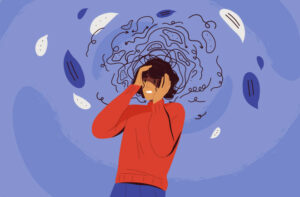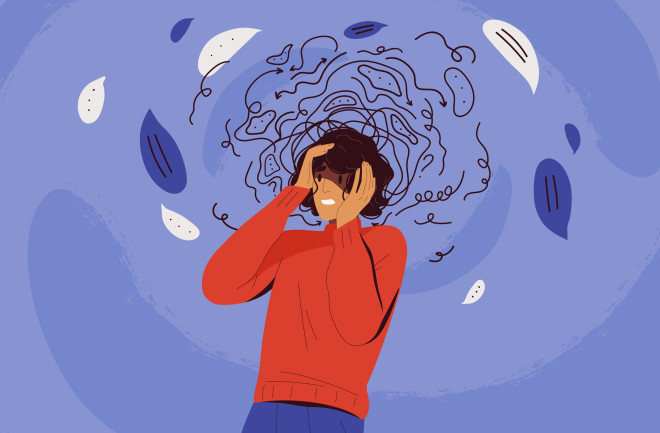If you or someone you know is suffering from post-traumatic stress disorder (PTSD) or obsessive-compulsive disorder (OCD), it’s important to get the facts about these conditions. This blog post will provide an overview of PTSD and OCD, including the symptoms, causes, and treatment options. We hope that this information will help you or your loved one get the support and care needed to manage these disorders.
Contents
What Are PTSD And OCD?
 PTSD and OCD are both mental disorders that can have a significant impact on a person’s life. PTSD is a disorder that can develop after exposure to a traumatic event, such as combat, sexual assault, or a natural disaster. OCD is a disorder characterized by obsessive thoughts and repetitive behaviors.
PTSD and OCD are both mental disorders that can have a significant impact on a person’s life. PTSD is a disorder that can develop after exposure to a traumatic event, such as combat, sexual assault, or a natural disaster. OCD is a disorder characterized by obsessive thoughts and repetitive behaviors.
PTSD and OCD often co-occur, which means that people who have one are more likely to also have the other. Treatment for both disorders typically includes medication and therapy.
PTSD occurs when someone has experienced or witnessed a traumatic event. This can include combat, sexual assault, natural disasters, car accidents, and more. Symptoms of PTSD can include flashbacks, nightmares, anxiety, depression, and avoidance of anything that reminds the person of the trauma. PTSD can also lead to problems with alcohol or drug abuse.
OCD is a disorder characterized by obsessive thoughts and repetitive behaviors. People with OCD may have obsessions about germs or contamination, which can lead them to wash their hands excessively or avoid touching things altogether. They may also have intrusive thoughts about harm coming to themselves or others.
Symptoms Of PTSD And OCD
The symptoms of PTSD can include flashbacks, nightmares, anxiety, depression, irritability, and difficulty sleeping. People with OCD may have obsessions (recurrent and intrusive thoughts) and/or compulsions (repetitive behaviors).
These symptoms of PTSD and OCD can interfere with a person’s ability to work, go to school, or take care of their family. If you think you may have PTSD or OCD, it is important to talk to your doctor or mental health professional.
There may be many causes for developing either PTSD or OCD. Some people may be more likely to develop these disorders if they have a family history of mental illness, experienced trauma at a young age, or have a history of substance abuse.
Relationship Between PTSD And OCD
The relationship between post-traumatic stress disorder (PTSD) and obsessive-compulsive disorder (OCD) is a complicated one. PTSD is an anxiety disorder that can develop after exposure to a traumatic event, while OCD is a chronic and often debilitating mental health condition characterized by intrusive thoughts, compulsions, and extreme anxiety.
There is a significant body of research that has looked at the relationship between PTSD and OCD. Some studies have found that people with PTSD are more likely to also suffer from OCD, while other studies have found that people with OCD are more likely to develop PTSD. Still, other studies have found no link between the two conditions.
It’s important to note that just because someone has PTSD does not mean they will automatically develop OCD and vice versa. However, the two conditions share certain risk factors, such as a history of trauma or abuse, which may increase the likelihood of developing both disorders. There can also be many similarities between the two conditions, such as intrusive thoughts, avoidance behaviors, and anxiety.
If you or someone you know is struggling with PTSD or OCD, it’s important to seek professional help. Both disorders can be extremely debilitating, but treatment can make a world of difference. If you’re not sure where to start, talking to your doctor or a mental health professional can be a good first step.
Treatment of PTSD And OCD

Treating PTSD and compulsive disorder is often done with a combination of medication and therapy. The most common type of therapy used to treat PTSD is exposure therapy. This type of therapy gradually exposes the person to the thing they are afraid of. This can help them learn to feel less scared and more in control. Medication can also be used to help with symptoms such as anxiety and depression. It is important to talk to a doctor or mental health professional about what treatment might be best for you.
There is hope for people who suffer from PTSD and compulsive disorder. With proper treatment, many people can live normal, healthy lives. If you or someone you know is struggling, don’t hesitate to reach out for help.
How To Prevent PTSD And OCD?
Preventing PTSD and OCD can be difficult, but there are some things you can do to lower your risk.
If you have experienced a traumatic event, it is important to get help right away. Talking to a therapist or counselor can help you process the event and start to heal. If you are struggling to cope, consider seeking out support groups or therapy.
There are also things you can do to protect your mental health in the future. Be sure to take care of yourself physically by eating well, getting enough sleep, and exercising regularly. Find ways to relax and manage stress, such as yoga, meditation, or deep breathing exercises. Make time for activities that make you happy and build positive relationships with friends and family. By taking care of yourself mentally and emotionally, you will be better equipped to handle stress and trauma if it does occur.
PTSD and OCD can be difficult to deal with, but there are treatments available that can help. If you or someone you know is struggling, don’t hesitate to seek out professional help. With the right support, recovery is possible.
Conclusion
PTSD and OCD are difficult things to deal with. But, it is possible to manage both conditions with the help of mental health professional. If you or someone you know is struggling with PTSD or OCD, please seek professional help.
There are many resources available for people who suffer from PTSD and OCD. The most important thing is to seek professional help if you think you might have either condition. Do not try to self-diagnose or self-treat these conditions. only a qualified mental health professional can provide an accurate diagnosis and treatment plan.
If you or someone you know needs help, there are many resources available.
If you’re struggling with mental health problems, know that you’re not alone. MantraCare is here to help you with these mental health disorders. We offer group therapy, self-help strategies, and professional help. Contact us today to learn more about how we can help you! Helping someone with these disorders can be difficult, but it is important to encourage professional treatment, listen and be supportive, and encourage healthy coping mechanisms. MantraCare is here to help you every step of the way. You can also book a therapy or download our free Android or iOS app.


